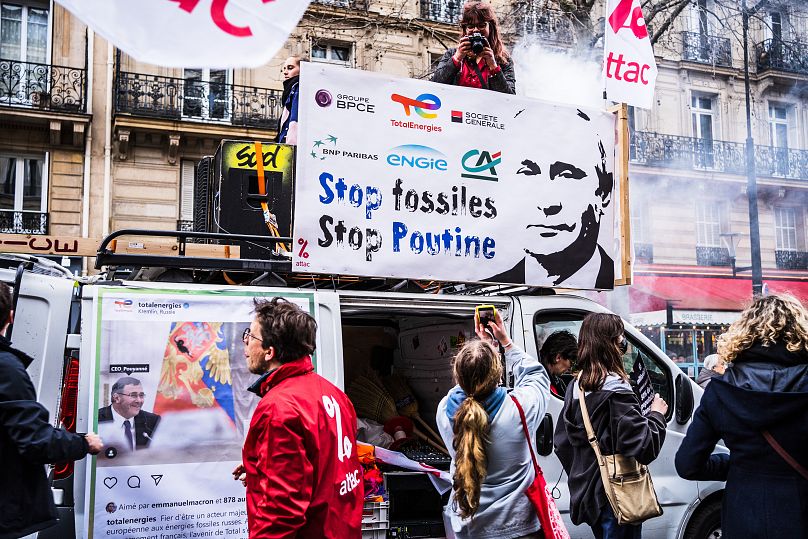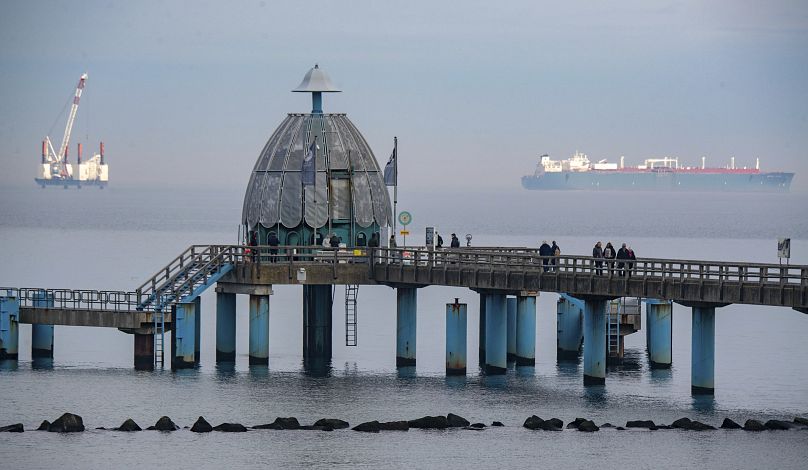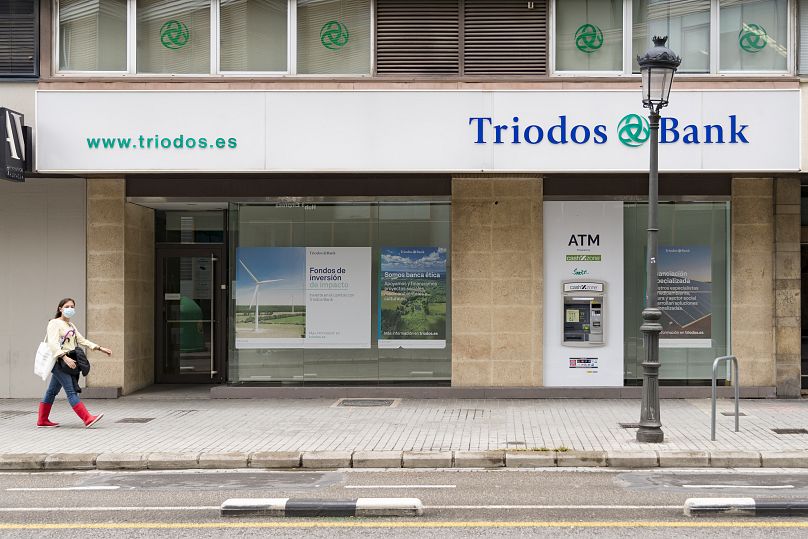Big banks are 'gambling' with our climate, a new report shows, acted out by Game of Thrones stars. Where are the ethical banks?
Banks are in a “toxic relationship” with fossil fuel companies. That’s the message behind a new short film starring Game of Thrones’ Rose Leslie and Kit Harrington, cleverly transferring the climate-wrecking bond to a couple’s therapy room.
 ADVERTISEMENT
ADVERTISEMENT
 ADVERTISEMENT
ADVERTISEMENT
Directed by Richard Curtis for the Make My Money Matter campaign, the real-life couple play an oil company and high street bank, forced to hide their love from public view.
It follows the revelation that the world’s largest banks poured more than €60 billion into fossil fuel financing last year.
Compiled by the Rainforest Action Network and others, the Banking on Climate Chaos report makes for maddening reading as the consequences of these investments are revisited on the world with increasing severity.
Since the Paris Agreement came into effect in 2016 - binding countries to limit global heating - the world’s 60 largest banks have spent a staggering €4.9 trillion on fossil fuels.
Last year, the report reveals a Canadian bank was the worst offender. Royal Bank of Canada (RBC) furnished fossil fuel companies with more than €38 billion in 2022, overtaking JP Morgan Chase for the first time since 2019. But the American bank is still well ahead with its nearly €400 billion total over the last seven years.
Though US multinationals dominate the fossil fuel financing scene, European banks are playing a leading role in lending and underwriting debt to oil and gas giants too.
Given the size of these institutions, you’re likely to see your bank on the list of dirtiest financiers. But money talks, as they say, so we’ve also looked at where your funds could be better stored - and how to hold your bank accountable.
Which European banks are the biggest fossil fuel investors?
French bank BNP Paribas remains the worst in Europe according to the report, with its fossil fuel financing hitting €18.9 billion last year.
BNP Paribas is the first commercial bank to be sued over its loans to oil and gas majors. The current legal action by three NGOs - Oxfam, Friends of the Earth and Notre Affaire à Tous - could set a vital precedent for holding banks to account for their stated net zero commitments.
The report traces funds from the eurozone’s biggest bank to a range of fossil fuel companies, including BP, Var Energi, TotalEnergies, Saudi Arabian Oil and Shell.
From 2016 to 2022, the UK’s Barclays Bank sent the most funding to fossil fuel companies, primarily Exxon Mobil. HSBC, also based in Britain, ranks third highest in the list of last year’s most fossil fuel-friendly banks in Europe.
“Fossil fuel companies are the ones dousing the planet in oil, gas, and coal, but big banks hold the matches,” comments April Merleaux, co-author and Research and Policy Manager at Rainforest Action Network. “Without financing, fossil fuels won’t burn.”
LNG funding almost doubled last year
One of the key trends in Europe last year was the expansion of the liquified natural gas (LNG) sector, as countries sought alternatives to Russian fuels.
Banks backed investment in this non-renewable energy source, despite energy experts warning that new projects were unnecessary and would lead to a bigger supply than is needed.
The top 30 companies expanding LNG used the crisis to secure nearly 50 per cent more financing in 2022 compared to 2021, the report finds.
Co-author Maaike Beenes, campaign lead at BankTrack, says banks are taking an “irresponsible gamble with our climate”.
“The Netherlands’ own ING was one of the worst offenders,” she explains. “These gas projects will not be able to address Europe’s short-term energy needs or reduce household bills - instead they will lock us into dependence on fossil fuels for decades.”
ReCommon, one of more than 600 civil society organisations endorsing the report, also calls out the role of Italy’s two main banks.
“[Unicredit and Intesa Sanpaolo] seem to ignore the alarms of the scientific community,” says finance and climate campaigner Daniela Finamore, “continuing to fuel the expansion of the fossil fuel industry and sniffing out new business opportunities, as in the case of LNG.”
Meanwhile, European banks BNP Paribas and Crédit Agricole topped the list of offshore oil and gas financiers in 2022.
Which European banks won’t spend your money on fossil fuels?
With so many of the world’s biggest banks pumping money into polluting projects, you might be struggling to choose where to entrust your hard-earned euros.
Switching to the least-worst offenders (like Caixa Bank in Spain and Denmark’s Danske Bank) doesn’t feel quite up to the task. Though it’s worth noting that the 60th bank on the list, France’s La Banque Postale, has committed to a complete exit from oil and gas by 2030. It proves that banks don’t have to be specifically ethical to make the right calls.
"The investment and lending decisions made by banks radically shape our society and environment,” Ruairidh Fraser, a researcher at Ethical Consumer tells Euronews Green.
“It is important that customers can find out what banks are doing with their money and what policies, if any, guide their choices.”
In an industry rife with greenwashing, transparency is king. Fraser advises that customers look for banks with robust ethical lending criteria and detailed lending and investment disclosure.
And there’s a clear winner according to the alternative consumer organisation. Triodos Bank publishes details of every company that it lends to on its website. Many of these companies are behind impactful environmental projects - including two Scottish rewilding sites led by ‘natural capital developer’ Oxygen Conservation.
Headquartered in the Netherlands, Triodos’s services are also available in the UK, Belgium, Spain and Germany.
Other leading ethical banks around Europe include GLS in Germany and Dutch ‘neobank’ Bunq. It allows you to link up your savings accounts to an app and have the freedom to choose where your money is invested.
There are several tools that can help your search for the best bank, such as Bank.Green and SwitchIt.Green in the UK and the Fair Finance Guide which is active in 15 countries.
Sticking with your bank? Here’s how to get them to step up
“Banks care about their public image and reputation,” says BankTrack’s Beenes.
“Even short of switching to an ethical bank, which might be practically challenging, customers of fossil banks can really help build pressure by sending messages to their bank asking it to stop financing fossil fuel expansion and phase out all financing on a 1.5C-aligned timeline.”
The Banking on Climate Chaos report wants to make information about bank financing for fossil fuels public to help facilitate this kind of consumer action, she says.
If your bank doesn’t make its lending criteria and investments publicly available, Ethical Consumer’s Fraser advises writing to your bank manager to request it.
“Normalising transparency is a crucial first step in holding the financial sector accountable to its net zero claims.”













